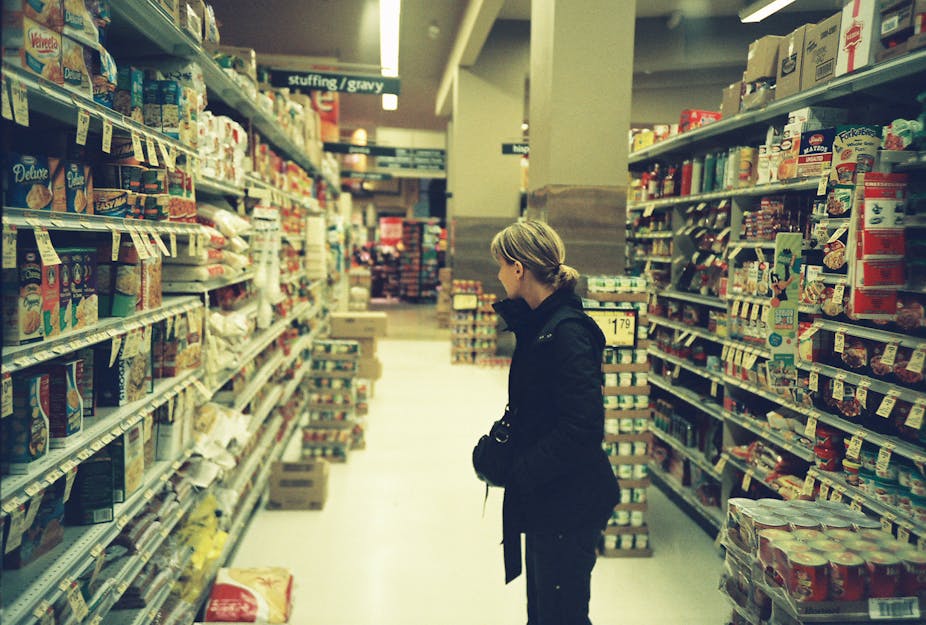A German supermarket chain has introduced a wide-ranging supply-chain policy on animal welfare that may be the most progressive in the world. Sadly, Australia’s supermarket chains are far behind in introducing such measures, despite their positive impact on public health.
In early February 2015, Aldi Süd – one of the two family-owned Aldi supermarket chains in Germany – announced a new purchasing policy tied to animal welfare. In future, Aldi Süd’s customers won’t find foie gras (the production of which involves force-feeding ducks and geese), rabbit meat or lobster in its stores.
Suppliers have been asked to phase out beak trimming of hens. Labels on meat products are expected to be clear about country of origin, as well as indicating the region where the animal was raised.
A forward-looking policy
The policy extends to non-food items, such as textiles (no wool products involving mulesing are allowed, for instance), clothing, shoes (leather alternatives are preferred), cosmetics and cleaning products. Fur and products from protected species, such as crocodiles and snakes, will no longer be part of Aldi Süd’s product range.
And it also applies to processed food items. So pasta or noodles can contain only free-range, barn-laid or organic eggs, for instance, and the same holds for baked goods.
Seafood products caught in ways that avoid by-catch or protected animals are preferred. For farmed fish, Aldi Süd expects humane living conditions and reduced use of chemicals and antibiotics, if any are used at all.
In addition, the policy encourages suppliers to engage more broadly and proactively with animal welfare. For example, it suggests suppliers become engaged – together with other stakeholders – in the development of animal welfare standards, contribute to the development of non-animal research methods and avoid animal experimentation.
In its new policy document, Aldi Süd writes (author’s translation from the original German):
As a responsible company, it is important to us to bring together ecology, the social and economic developments while preserving the natural sources of life.
Supermarkets in Australia
Supermarket chains in Australia – including Aldi Australia – don’t go beyond compliance with industry and regulatory standards, and a patchy collection of additional animal welfare requirements.
Perhaps the strongest aspects of the major Australian supermarkets’ animal welfare policies relate to egg-laying chickens and marine animals. Since January 2013, Coles brand eggs are from cage-free chickens. Woolworths is planning to sell only non-cage-produced eggs and use non-cage eggs in its brand products by December 2018.

Major Australian supermarket chains (Aldi Australia, Coles, Metcash – the major supplier to IGA supermarkets – and Woolworths) all have policies in regard to seafood labelling or traceability, or both. And they all express a commitment to sustainable fishing.
In January 2013, Coles announced it had removed sow stall-produced pork from its Coles brand product range. Woolworths sources fresh pork meat from farms that only use stalls for less than 10% of the sows’ gestation period.
Used in factory farming, sow stalls are small barren crates in which female pigs are confined during pregnancy. These cages are so small that the pig can hardly move and can’t turn around.
Aldi Australia and Woolworths reject animal testing other than when it is legally required, but Coles and Metcash do not have policies on animal testing.
A public health issue
Intensive animal farming methods are now the most common way of producing meat and other animal products, such as eggs and milk. Confined living spaces, lack of natural light, food that is different from what animals traditionally ate (animal feed is designed to have the animal grow fast and increase the amount of food converted to protein) all contribute to stress in the animals, which affects their immune system.
Stressed animals are more prone to infections and they are treated with antibiotics when ill as well as to prevent disease. Antibiotics are also thought to speed up animal growth.
Widespread prophylactic and sub-therapeutic (small dose) use of antibiotics in food-producing animals has a negative impact on human health. It also leads to antibiotic-resistant bacteria, which can cause infections in humans. Importantly, this has made available antibiotics less effective in treating human diseases.
While the use of antibiotics in food-producing animals may contribute to keeping the prices of meat, seafood, dairy and egg products down, it’s clearly less than ideal for human health and animal welfare. For many consumers, animal welfare and environmental sustainability are also important ethical issues.
Aldi Süd should be commended for introducing an animal-welfare supply-chain policy that is more far-reaching than the policies of comparable Australian companies. While consumer pressure would have contributed to its development, preserving “the natural sources of life” is in everybody’s interest.

